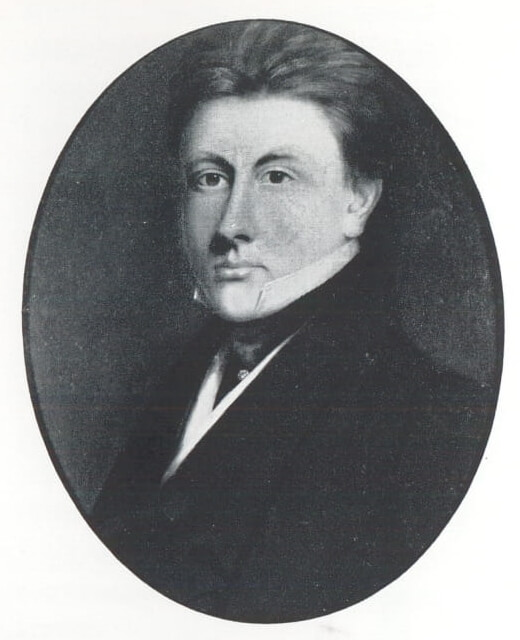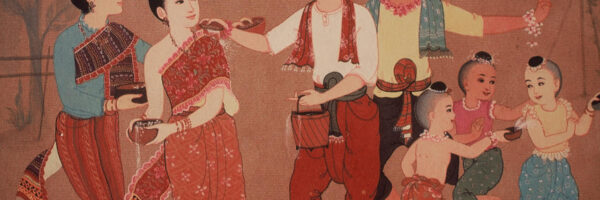
The first 19th century European merchant to reside in Thailand – Robert Hunter
Robert Hunter (1792-1848) was the first European merchant to reside in Siam. He was the most important intermediary between the royal court for two decades serving as an unofficial diplomat during the reign of King Rama II.
Hunter was originally from Scotland. His family were established merchants and traders since the early 18th century. They exported tobacco from Virginia to France, but that business ended with the start of the American Revolutionary. They started to manufacture linen, cotton and glass from their home town near Glasgow, Scotland.
Hunter first went to India to learn trading. He arrived in the newly founded Singapore in 1819 and founded a firm called Hunter Watt & Company. While he was there, the British East India Company sent James Low to Siam on the first diplomatic mission in 1824. Low was an officer of the English East India Company. He was also an early student of Thai. Low wanted to enlist Siam’s help for the British invasion or Burma and gain an agreement for trading rights with King Rama II. However, Low was not successful.

In the early 1820s, foreigners started to return to Siam after a hiatus of almost 140 years since all foreigners were expelled in 1688. In July 1824, King Rama III ascended to the throne. In a canny move, Hunter arrived in Bangkok that August bearing a gift of 1,000 muskets as the Siamese were preparing for war with Burma. Hunter spoke to the Minister of the Treasury (Phra Klang) and received the right to trade with other foreigners on behalf of the royal family and nobility. After receiving permission, Hunter was allowed to settle in Bangkok. In 1840, the King directed a prominent three storey building be erected in Thon Buri along the Chao Phaya River for his residence and business concern then called the “British Factory” (or what trading posts were called by Westerners then).
Hunter also obtained permission from the King for other Europeans, then living on house boats, to also build home along the riverbank. Many quickly moved ashore and built new houses. With no British legation in Bangkok, formal diplomatic relations or treaty, Hunter served as an unofficial British representative handling visitors and trading between Siam and Singapore with great success.
In 1825, Hunter wed Angelina Sap, a half-Siamese, half-Portuguese lady. She was also descended from Constantine Phaulkon, the famous 17th century Greek adventurer who was probably the most famous foreigner in early Siamese (or even in all Thai) history. Angelina taught Hunter to speak both Thai and Portuguese fluently. As there were no other English speakers (or Thai speaking foreigners) at court, the Hunter wielded enormous influence in trade negotiations and diplomacy by his ability to speak fluent Thai. As Christian missionaries and diplomatic missions began to pour into Thailand, Hunter was instrumental in guiding them. He also helped Henry Burney negotiate a successful trade treaty in 1826 between the Great Britain and Siam. In 1831 Hunter received the distinguished title of “Luang Awutwiset” which honored his service in supplying weapons to the kingdom.
Hunter was directly involved in introducing the most famous Thai personalities to the world (before 1965 Miss Universe winner Apasra Hongsakula, 1988 Miss Universe winner Porntip Nakhirunkanok, Tiger Woods and U.S. Senator Ladda Tammy Duckworth), namely the original “Siamese Twins,” nicknamed Chang and Eng (meaning “left” and “right” in Thai). In 1824, on a trip up the Chao Phaya River, Hunter spotted what he saw was a “strange animal.” It was the shirtless twins bathing along the river. He instantly saw the lucrative financial opportunity by displaying the twins to the public on an international tour. He first befriended the twins and their family, then sought permission from the King to bring them to England on tour. The twins and the family were agreeable, but it took five years for permission to be granted. In 1829 Hunter and his American business partner, a sea captain named Abel Coffin, sailed to Boston in 1829. They were an instant sensation. They went to New York to continue their successful tour and then to London. After their success there they toured the British Isles to great acclaim. However, the press of business in Siam forced Hunter to leave London for Bangkok. He departed on 28 September 1830. Coffin bought out Hunter’s interest in 1831, but Hunter kept in regular contact with the twins for years after.

Hunter then went into partnership with another British merchant named James Hayes. The 1826 Burney Treaty allowed more trade privileges for all the British merchants based in Singapore, but Hunter & Hayes completely dominated the market in Bangkok. They had a monopoly on imports from the U.K., but that concession was only limited to textiles from Liverpool. However, their business was overwhelming in exports. This was due to the monopoly they held on European type square-rigged sailing vessels that the royal court could use for their own trading interests.
This business arrangement between Hunter and the Siamese government could not last forever. As trade rapidly expanded throughout the 1830s, the King and nobility obtained their own sailing vessels. They now began to trade with foreign merchants who were crowding into Bangkok other than Hunter. Due to his rapidly falling profits, Hunter decided to trade in opium. This illicit trade was expressly strictly forbidden. But King Rama III had to tread lightly on the matter as he was worried about Hunter’s threat to summon the Royal Navy to defend his business interests. The King knew the fledgling Siamese Navy would be no match against British warships. However, disrupting opium shipment at sea was one thing, seizing illegal goods at the port was another.
In 1839, Hunter & Hayes suffered great losses when the Siamese government suddenly monopolised teak exports. Then in 1842, they suffered ever greater losses when the King imposed heavy customs duties on sugar and seized Hunter & Hayes’ stock to collect on the overdue customs bill. From close trading partners, both sides were now bitter rivals for trade and business.
The final straw was when King Rama III and Hunter fell out on the purchase of a steam warship. The First Opium War (1838-1842), involving Great Britain and China, had widespread regional repercussions. King Rama III was worried about British intentions towards Siam. He ordered a large supply of weapons and a steamship named the Express just in case the British attacked Siam. However, the war ended with the signing of the Treaty of Nanking in 1842 and the British did not attack Siam. By the time the steamship finally arrived on 11 January 1844 there was no need for it.
The negotiations between the King and Hunter quickly grew to be contentious. It is unclear if the King refused to pay for the vessel, or if Hunter quadrupled the price on delivery in an extortion attempt. Matters came to a head when Hunter threatened to sell the vessel to the Vietnamese, Siam’s sworn enemy at the time. The King was immediately outraged at this naked threat and Hunter was immediately expelled from the Kingdom. Hunter departed Bangkok on Express, bound for Singapore, on 24 February 1844.
Upon landing in Singapore, Hunter immediately lodged a complaint with the colonial governor. The governor proved to be non-committal. So Hunter took the Express to Calcutta and saw the head of the East India Company. Hunter stated that King Rama III had violated the Burney Treaty. He also wanted the establishment of a British counsel in Bangkok, British warships to be dispatched to intimidate the Siamese and a renegotiation of the import duty. Eventually, the Governor General of India ruled that the dispute was a personal one between Hunter and the King of Siam and wisely took no action. Hunter did make good on his threat to sell the Express to the Vietnamese but at a great loss of profit.
One of Hunter’ assistants at the firm, Christopher Harvey, ran the business while Hunter was away. Hunter returned in July 1844 to collect on his outstanding debts then dissolved the business for good. Hunter left Bangkok for good on 29 December 1844. He returned to his native Scotland and died in Glasgow on 07 September 1848.
Hunter’s son. Robert Jr., remained in Siam and maintained better relations with the court. He died on 19 April 1865 and was buried in Bangkok’s Protestant Cemetary. Hunter left an uneven legacy in Siam. It was said Hunter unsuccessfully mixed shrewdness and arrogance, zeal and kindness. In 1850, during James Brooke’s unsuccessful mission to extend the terms of a freer residency for Europeans, King Rama III specifically cited Hunter’s behaviour as the reason to reject any new agreement. The King distrusted Europeans for the rest of his reign. When King Rama IV ascended to the throne in 1851, trade relations became more cordial. The King signed the Bowring Treaty in 1855, trade between Siam and Great Britain saw a tremendous expansion.



